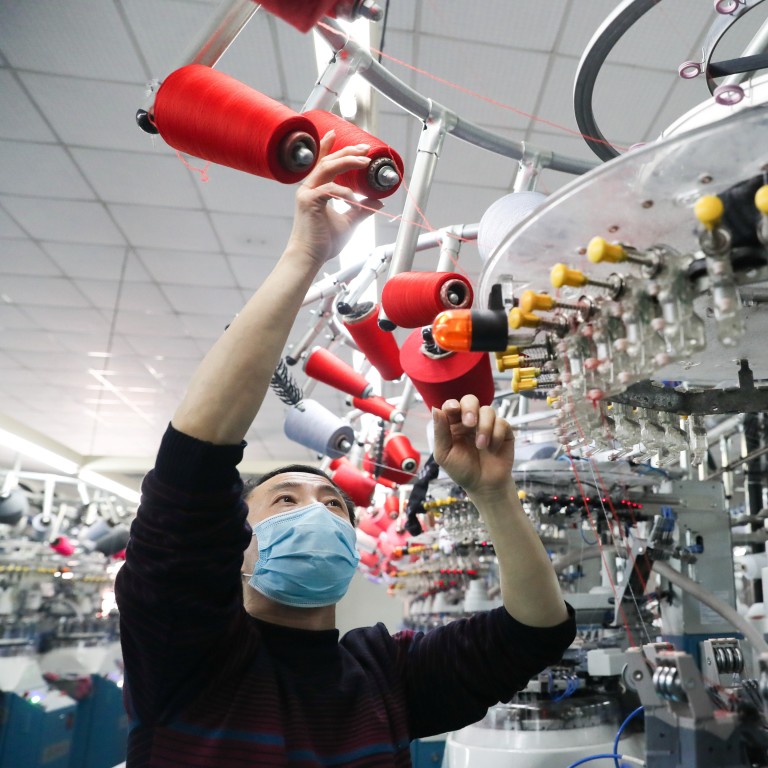
Help China’s key manufacturers plug back into global supply chain, Xi Jinping says
- Epidemic control must be balanced with restoring production, president says
- Economic goals for this year ‘remain unchanged’
Chinese President Xi Jinping said key enterprises in manufacturing supply chains should get help to resume output amid calls in other countries to cut reliance on Chinese suppliers.
He said officials must be vigilant to contain the epidemic, while also ensuring that China remained on track to resume output and meet its economic goals.
“Priority should be given to ensure leading companies that are important in the global supply chain restore production and supply, maintaining the stability of the supply chain,” he said. “It is necessary to help key export enterprises resume work and production as soon as possible.”
Xi’s remarks came as the number of new cases rose by 889, with 118 new deaths as of Thursday, a sharp increase from the 394 new infections reported a day earlier.
The rise was partly due to outbreaks in prisons in three provinces, including the epicentre of Hubei province.
“We have to be clear that The Peak of the outbreak has not yet been reached. The situation in Hubei and Wuhan [the provincial capital] is still grave and complicated,” state broadcaster CCTV quoted Xi saying. “The measures adopted to contain the outbreak should vary just as the situation in each place varies.”
Xi admitted that the outbreak would affect economic development but said the Chinese economy was resilient enough to withstand the challenges.
China’s economic development and poverty eradication goals for this year would remain unchanged, and the country would continue opening up its economy, he said.
Officials at different levels should help workers get back to work in an orderly manner and ensure supplies of protective equipment to companies.
Officials should be on guard against major financial risk, and prevent the emergence of systemic risks. Support also should be given to small and medium-size enterprises, Xi said.
The coronavirus has spread to more than 25 countries since it emerged in late December, with Japan reporting 727 cases – most from a cruise ship docked in Yokohama – and South Korea having 204 infections. Cases have also been reported in Europe, North America, Africa, the Middle East and Australia.
Sweeping emergency measures have been in place in China for about a month, with cities in lockdown and work on hold across the country, raising doubts that China can still meet its goal of 6 per cent GDP growth.
Foreign businesses said manufacturers still could not run at full capacity because of shortages of supplies such as masks and logistical problems caused by restrictions on movement.
The economic effect has also been felt elsewhere, including in France where Finance Minister Bruno Le Maire said the epidemic would take 0.1 points off growth, highlighting France’s need to cut its dependence on China.
Wang Wen, executive dean of the Chongyang Institute for Financial Studies at Renmin University, said the decision to ensure production at key companies was a strategic choice to balance the need to contain the virus with the need to get the economy back to normal.
“China’s position in the global value chain will be affected by the coronavirus, but the impact won’t be deadly,” Wang said.
Bank of Communications senior researcher Liu Xuezhi warned that the stoppages in Chinese manufacturing raised the risk of more capacity being moved overseas.
“China’s deep integration into the global supply chain is not fixed. As a matter of fact, energy and labour-intensive industries have already been squeezed by the trade war with the United States in the past two years,” Liu said.
“If the production disruptions last to March or April, the transfer of industries will be accelerated,” Liu said. “The impact of the coronavirus epidemic could be even larger than that of US trade protectionism.”
In the Politburo meeting, Xi also called for proper prevention efforts in Beijing to contain the outbreak. A stable supply of agricultural products at affordable prices and backup for medical workers were also needed.
Additional reporting by Frank Tang and Reuters
Purchase the China AI Report 2020 brought to you by SCMP Research and enjoy a 20% discount (original price US$400). This 60-page all new intelligence report gives you first-hand insights and analysis into the latest industry developments and intelligence about China AI. Get exclusive access to our webinars for continuous learning, and interact with China AI executives in live Q&A. Offer valid until 31 March 2020.



